University towns
Although most of our foreign students live and study in Budapest, the cities in the countryside also have many things to offer for students. We have listed some of the most significant cities below and what they are famous for.
Budapest
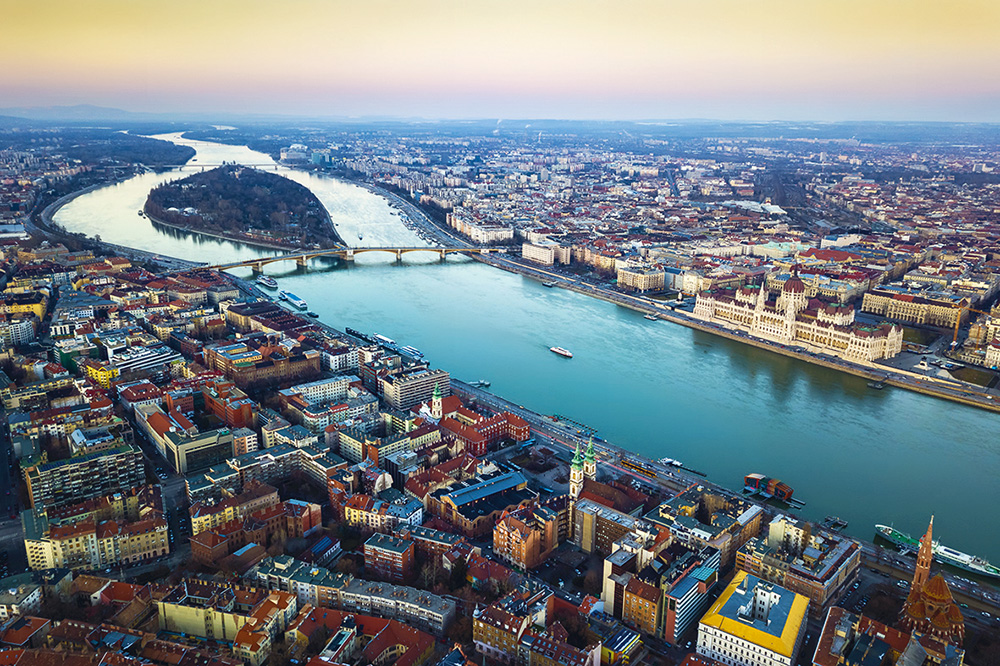 Budapest is the capital of Hungary, located in the heart of the country. As lying on the banks of the Danube River, Budapest is divided into two main parts: the romantic Buda side with its beautiful hilly surroundings, and the vibrant Pest full of culture and life. The city offers a fusion of various cultural and historic values preserved by its architecture, cosy streets, and numerous exciting events. Budapest, including the Banks of the Danube, the Buda Castle Quarter and the Andrássy Avenue were selected among the UNESCO world heritage sites. The city is not only a cultural, but an educational hub as well – half of Hungary’s university students study here, so you will meet a diverse student community coming from all parts of the world.
Budapest is the capital of Hungary, located in the heart of the country. As lying on the banks of the Danube River, Budapest is divided into two main parts: the romantic Buda side with its beautiful hilly surroundings, and the vibrant Pest full of culture and life. The city offers a fusion of various cultural and historic values preserved by its architecture, cosy streets, and numerous exciting events. Budapest, including the Banks of the Danube, the Buda Castle Quarter and the Andrássy Avenue were selected among the UNESCO world heritage sites. The city is not only a cultural, but an educational hub as well – half of Hungary’s university students study here, so you will meet a diverse student community coming from all parts of the world.
Debrecen
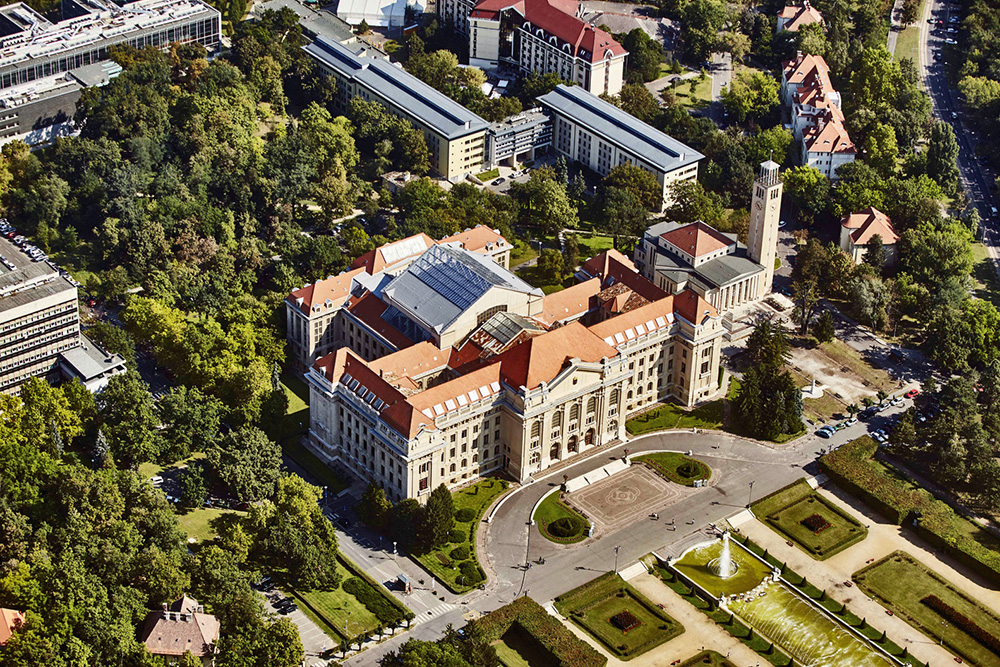 Debrecen is the regional centre of the Northern Great Plain and the seat of Hajdú-Bihar County. The city has a unique balance of centuries-old traditions, where you can find several excellent art exhibitions, various folk programmes as well as many sports and leisure events. One of the most famous of all is the Flower Carnival, which takes place each year on 20th August, and offers amazing cultural experience with parades and numerous concerts. Debrecen is home to the University of Debrecen, located in the beautiful “Great Forest” area. With a student body of about 28,500, the University is one of the largest higher education institutions in Hungary offering more than 80 programmes in almost every study field.
Debrecen is the regional centre of the Northern Great Plain and the seat of Hajdú-Bihar County. The city has a unique balance of centuries-old traditions, where you can find several excellent art exhibitions, various folk programmes as well as many sports and leisure events. One of the most famous of all is the Flower Carnival, which takes place each year on 20th August, and offers amazing cultural experience with parades and numerous concerts. Debrecen is home to the University of Debrecen, located in the beautiful “Great Forest” area. With a student body of about 28,500, the University is one of the largest higher education institutions in Hungary offering more than 80 programmes in almost every study field.
Miskolc
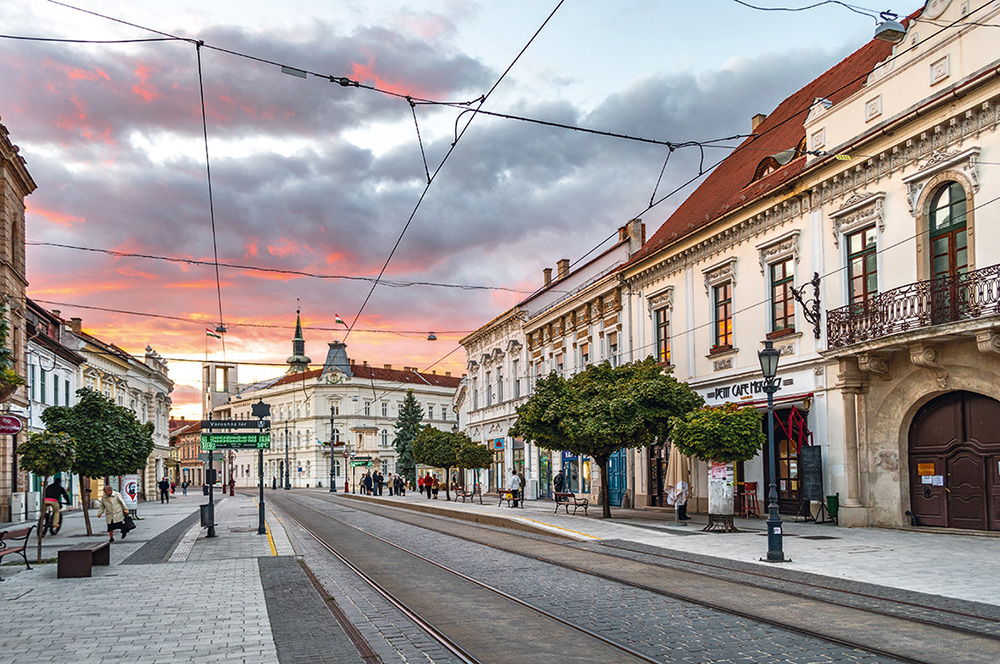 Miskolc is the seat of Borsod-Abaúj-Zemplén County and the regional centre of Northern Hungary. The city is located at the foothills of the Bükk Mountains, near the UNESCO heritage site of Aggtelek and the world famous Tokaj wine region. Miskolc is full of hidden treasures like the Benedictine Monastery Ruins or the Cave Bath of Miskolctapolca, and it is also famous for the Castle of Diósgyőr with its authentic historic plays. Nowadays, Miskolc is one of the most popular choices for students who come to study in Hungary. Founded in 1735, the University of Miskolc became the scientific centre of the region offering programmes in the fields of technical and social sciences as well as humanities.
Miskolc is the seat of Borsod-Abaúj-Zemplén County and the regional centre of Northern Hungary. The city is located at the foothills of the Bükk Mountains, near the UNESCO heritage site of Aggtelek and the world famous Tokaj wine region. Miskolc is full of hidden treasures like the Benedictine Monastery Ruins or the Cave Bath of Miskolctapolca, and it is also famous for the Castle of Diósgyőr with its authentic historic plays. Nowadays, Miskolc is one of the most popular choices for students who come to study in Hungary. Founded in 1735, the University of Miskolc became the scientific centre of the region offering programmes in the fields of technical and social sciences as well as humanities.
Szeged
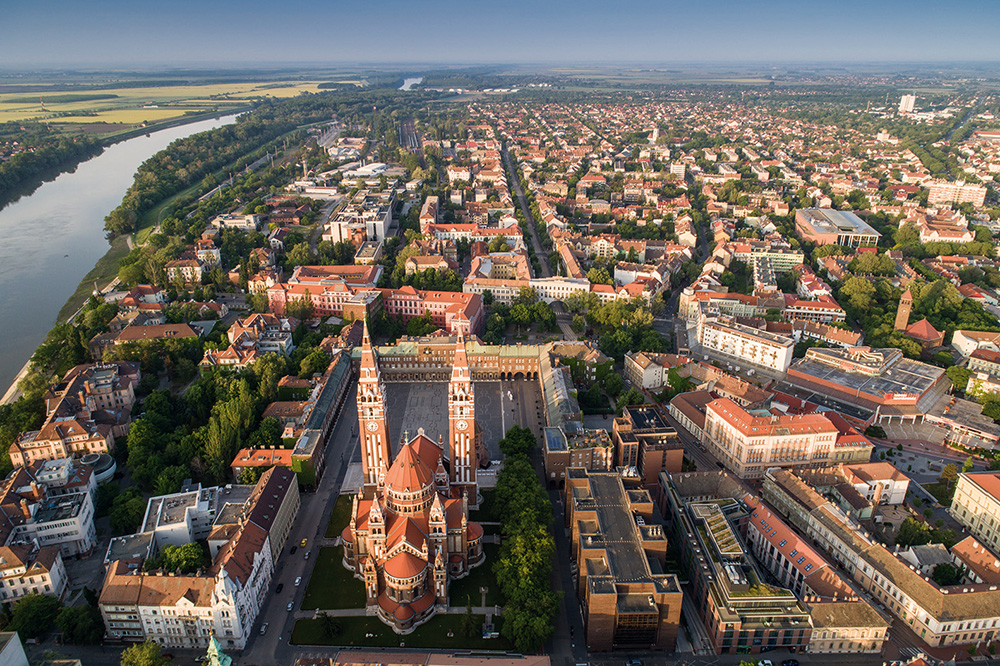 Szeged is the regional centre of South-Eastern Hungary and the seat of Csongrád-Csanád County. The city lies at the bank of the Tisza River, which gives a picturesque view to the entire area nearby. Szeged gives home to numerous cultural programmes and festivals, such as the famous Szeged Open-Air Festival at the marvellous Cathedral Square or the annually organised SZIN (Youth Days of Szeged), which won the Greener Festival Awards in 2009. With its 12 faculties, 19 doctoral schools and a Teacher Training Centre, the University of Szeged is among the largest and most prestigious higher education institutions in Hungary. The institution has mjore than 22,000 students with a 20% international student ratio, and offers a wide range of academic programmes from humanities to business studies and even health sciences.
Szeged is the regional centre of South-Eastern Hungary and the seat of Csongrád-Csanád County. The city lies at the bank of the Tisza River, which gives a picturesque view to the entire area nearby. Szeged gives home to numerous cultural programmes and festivals, such as the famous Szeged Open-Air Festival at the marvellous Cathedral Square or the annually organised SZIN (Youth Days of Szeged), which won the Greener Festival Awards in 2009. With its 12 faculties, 19 doctoral schools and a Teacher Training Centre, the University of Szeged is among the largest and most prestigious higher education institutions in Hungary. The institution has mjore than 22,000 students with a 20% international student ratio, and offers a wide range of academic programmes from humanities to business studies and even health sciences.
Pécs
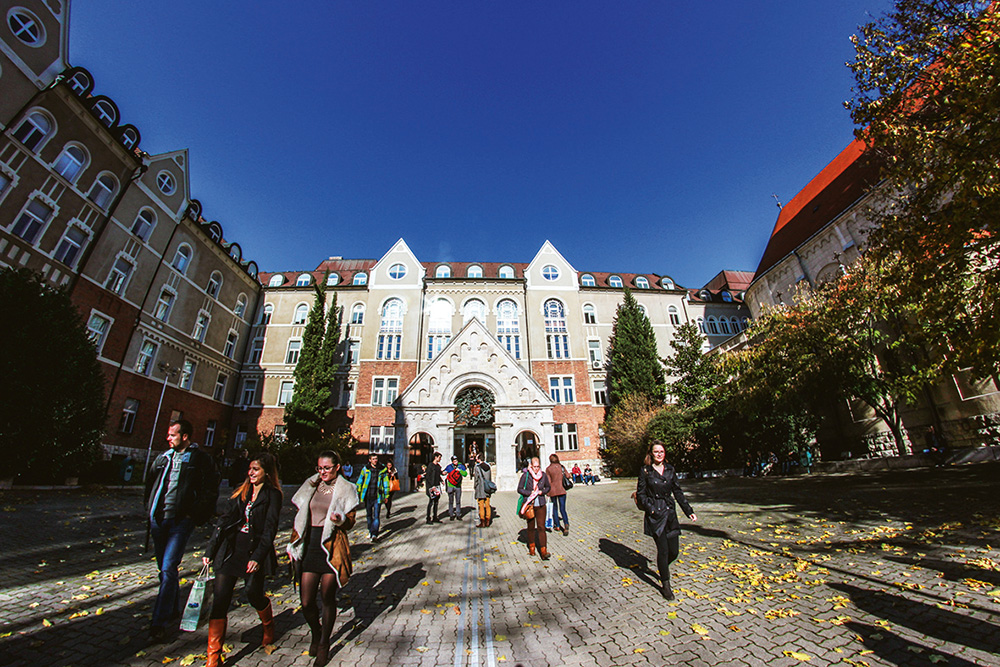 Pécs is located in the south-west of the country and serves as the administrative and economic centre of Baranya County. The city hosts many cultural scenes and historic buildings, such as the Basilica of St. Peter constructed in the 11th century, or the Turkish buildings from the ages of the Ottoman Empire. The city also gives home to the Early Christian Necropolis, an UNESCO World Heritage Site. Thanks to its rich multicultural atmosphere, Pécs was nominated to be the European Capital of Culture in 2010 and received the UNESCO Learning City Award in 2017. The University of Pécs was founded in 1367, making it the oldest university in Hungary. It offers a wide scale of degree programmes for more than 20,000 students at 10 faculties, covering nearly every possible field of study.
Pécs is located in the south-west of the country and serves as the administrative and economic centre of Baranya County. The city hosts many cultural scenes and historic buildings, such as the Basilica of St. Peter constructed in the 11th century, or the Turkish buildings from the ages of the Ottoman Empire. The city also gives home to the Early Christian Necropolis, an UNESCO World Heritage Site. Thanks to its rich multicultural atmosphere, Pécs was nominated to be the European Capital of Culture in 2010 and received the UNESCO Learning City Award in 2017. The University of Pécs was founded in 1367, making it the oldest university in Hungary. It offers a wide scale of degree programmes for more than 20,000 students at 10 faculties, covering nearly every possible field of study.
Győr
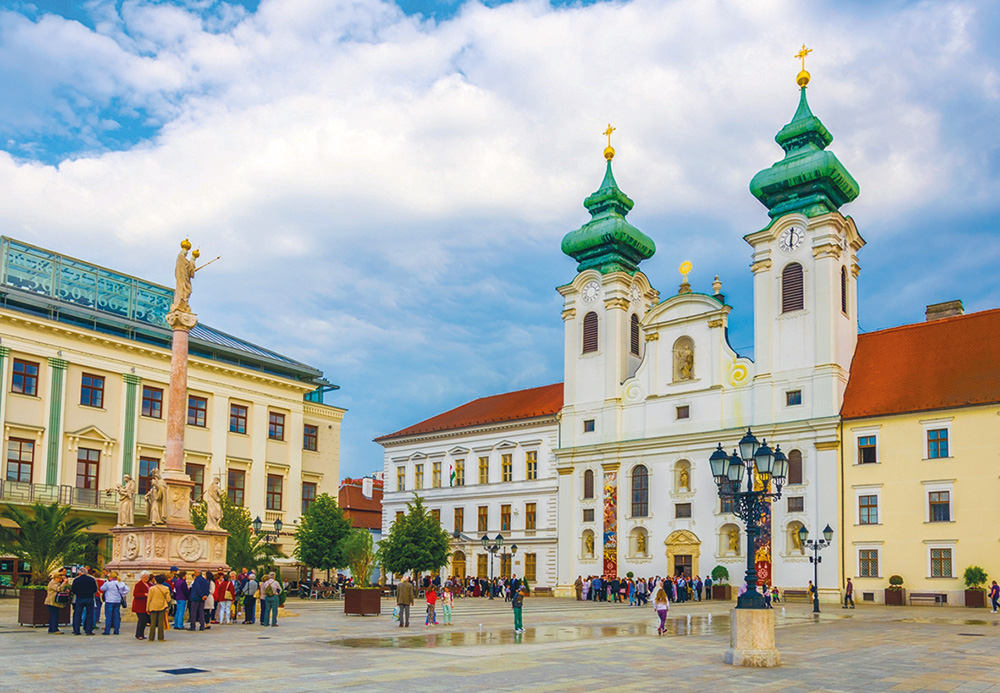 Győr is located in the north-western part of Hungary. The seat of Győr-Moson-Sopron County lies on one of the most important roads of Central Europe, halfway between Budapest, Vienna and Bratislava. The city has a charming downtown with thousands year-old Christian monasteries, beautiful baroque buildings and romantic riverside boardwalks. The University of Győr, Széchenyi István University has an excellent reputation in engineering education, transportation, and telecommunications. For its more than 13,500 students, the university offers first-hand, practice-oriented knowledge and excellent training opportunities through its industrial partners.
Győr is located in the north-western part of Hungary. The seat of Győr-Moson-Sopron County lies on one of the most important roads of Central Europe, halfway between Budapest, Vienna and Bratislava. The city has a charming downtown with thousands year-old Christian monasteries, beautiful baroque buildings and romantic riverside boardwalks. The University of Győr, Széchenyi István University has an excellent reputation in engineering education, transportation, and telecommunications. For its more than 13,500 students, the university offers first-hand, practice-oriented knowledge and excellent training opportunities through its industrial partners.
Dunaújváros
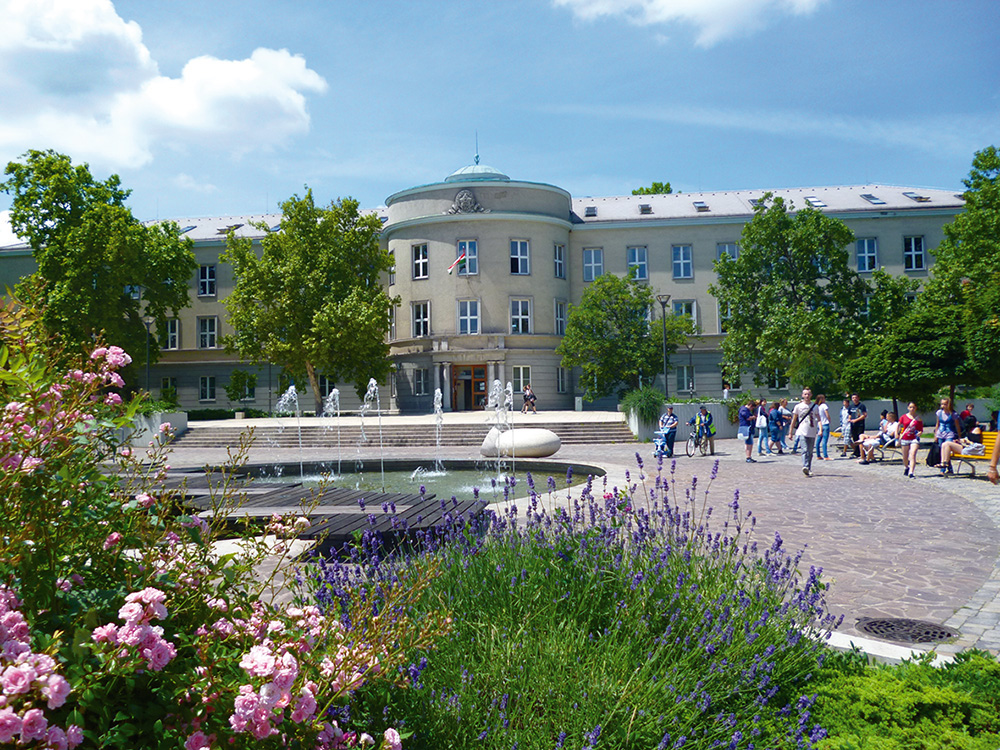 Dunaújváros is situated in the centre of Hungary, quite near – only 67 km – to Budapest. The town has been mainly known by its industry, as it was built related to the Danube Iron Works, the largest metallurgical-mechanical complex of Hungary. It lies only 50 km from the city of Paks, the seat of the Paks Nuclear Power Plant as well. Dunaújváros has many economic values and excellent infrastructural facilities. The University of Dunaújváros is located in the heart of the city with a very modern campus of more than 2000 students enrolled. The university offers a wide range of courses from metallurgical and mechanical engineering to communication and media studies.
Dunaújváros is situated in the centre of Hungary, quite near – only 67 km – to Budapest. The town has been mainly known by its industry, as it was built related to the Danube Iron Works, the largest metallurgical-mechanical complex of Hungary. It lies only 50 km from the city of Paks, the seat of the Paks Nuclear Power Plant as well. Dunaújváros has many economic values and excellent infrastructural facilities. The University of Dunaújváros is located in the heart of the city with a very modern campus of more than 2000 students enrolled. The university offers a wide range of courses from metallurgical and mechanical engineering to communication and media studies.
Eger
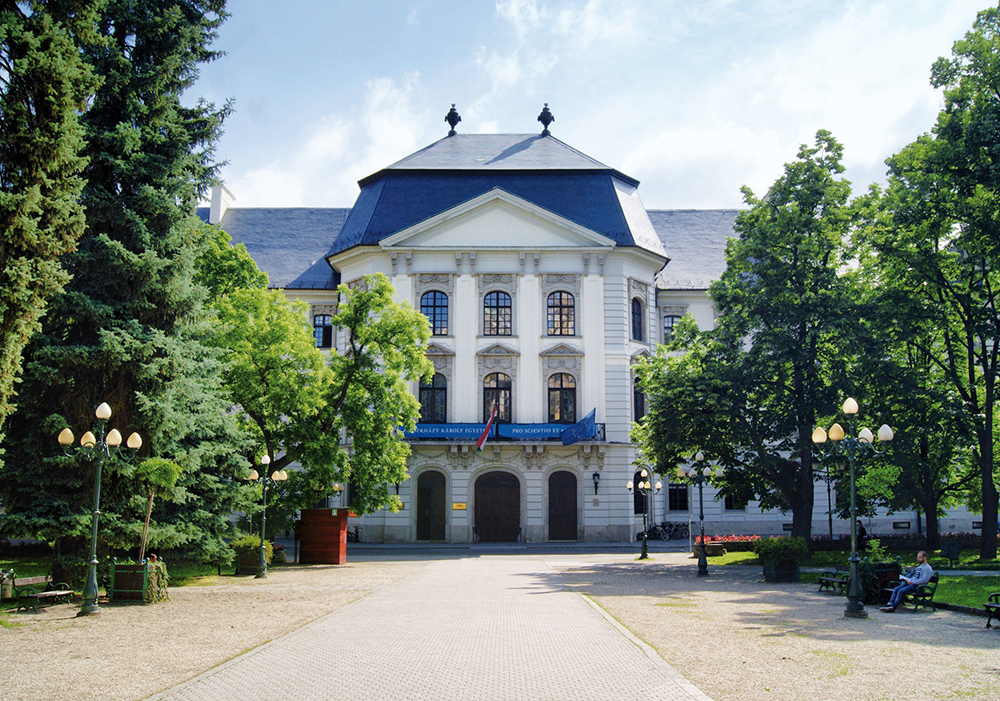 Eger is located in the northeastern part of Hungary at the feet of the North Hungarian Mountains. The town tells the stories of the Mongol invasion and the Ottoman occupation: the historically significant Castle of Eger, the Turkish Bath, or the Minaret all shape the unique landscape of the region. As being the centre of the Eger wine region, the town gives home to numerous wine cellars and festivals, offering a lot of possibilities to immerse in its culture. It is also known for the famous Bull’s Blood wine, the traditional red wine of the region. Eszterházy Károly Catholic University, with its seat in Eger, offers available courses ranging from economics and social sciences to pedagogy. Beside Eger, the university has campuses in two other towns as well: Gyöngyös and Sárospatak.
Eger is located in the northeastern part of Hungary at the feet of the North Hungarian Mountains. The town tells the stories of the Mongol invasion and the Ottoman occupation: the historically significant Castle of Eger, the Turkish Bath, or the Minaret all shape the unique landscape of the region. As being the centre of the Eger wine region, the town gives home to numerous wine cellars and festivals, offering a lot of possibilities to immerse in its culture. It is also known for the famous Bull’s Blood wine, the traditional red wine of the region. Eszterházy Károly Catholic University, with its seat in Eger, offers available courses ranging from economics and social sciences to pedagogy. Beside Eger, the university has campuses in two other towns as well: Gyöngyös and Sárospatak.
Veszprém
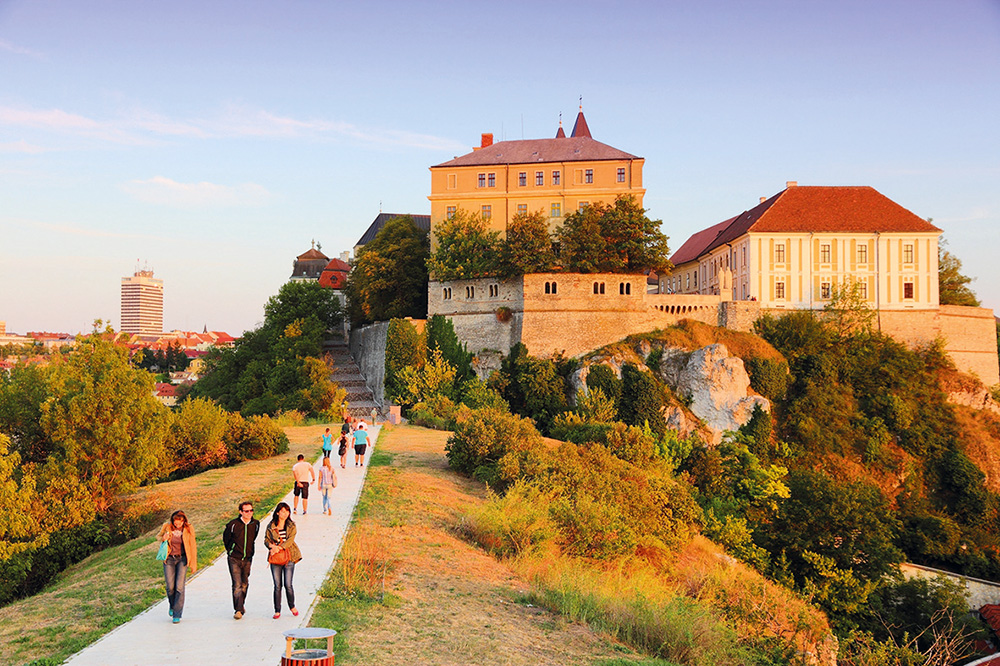 Veszprém is one of the most charming cities of Hungary surrounded by the hills of Bakony and the Balaton Uplands. There are many things to see and do in this mountainous, historical town like several festivals (Streetmusic Festival and the VeszprémFest), the famous Castle District or the popular Veszprém Zoo. University of Pannonia was founded here in 1949 and offers multiple programmes at three university campuses in Veszprém, Kőszeg and Nagykanizsa. Its programmes cover almost all fields of study from engineering, media studies to economics and various social sciences, with nearly 60 majors at all degree levels. Thanks to its rich cultural and historic heritage, Veszprém will hold the title of European Capitals of Culture in 2023.
Veszprém is one of the most charming cities of Hungary surrounded by the hills of Bakony and the Balaton Uplands. There are many things to see and do in this mountainous, historical town like several festivals (Streetmusic Festival and the VeszprémFest), the famous Castle District or the popular Veszprém Zoo. University of Pannonia was founded here in 1949 and offers multiple programmes at three university campuses in Veszprém, Kőszeg and Nagykanizsa. Its programmes cover almost all fields of study from engineering, media studies to economics and various social sciences, with nearly 60 majors at all degree levels. Thanks to its rich cultural and historic heritage, Veszprém will hold the title of European Capitals of Culture in 2023.
Gödöllő
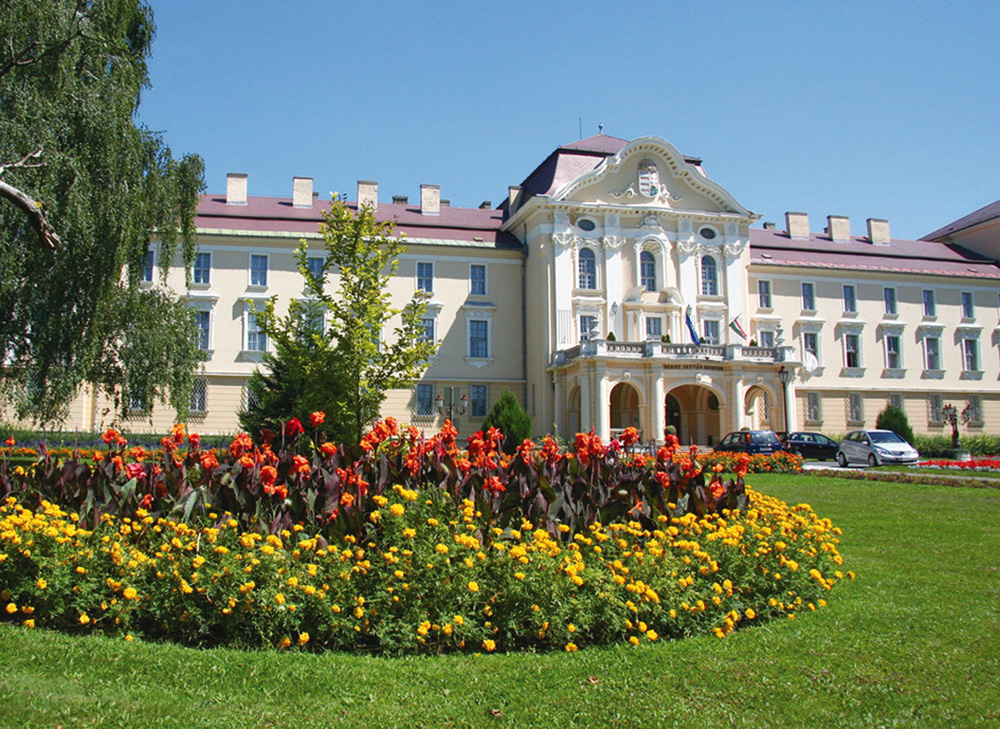 Proud of its green, panoramic areas, Gödöllő is a university town located very close to Budapest. The town’s most famous sight is the Grassalkovich castle: the 18th-century building is one of the largest Baroque castles in Hungary. With the establishment of the Agrarian University, Gödöllő became an agrarian centre of the country in 1950. Today it gives home to the Hungarian University of Agriculture and Life Sciences (the former Szent István University), which currently operates not just in Gödöllő, but with one campus in the town of Budapest, Gyöngyös, Kaposvár and Keszthely. With a wide range of study programmes, the university became the agricultural education hub of the country.
Proud of its green, panoramic areas, Gödöllő is a university town located very close to Budapest. The town’s most famous sight is the Grassalkovich castle: the 18th-century building is one of the largest Baroque castles in Hungary. With the establishment of the Agrarian University, Gödöllő became an agrarian centre of the country in 1950. Today it gives home to the Hungarian University of Agriculture and Life Sciences (the former Szent István University), which currently operates not just in Gödöllő, but with one campus in the town of Budapest, Gyöngyös, Kaposvár and Keszthely. With a wide range of study programmes, the university became the agricultural education hub of the country.
Nyíregyháza
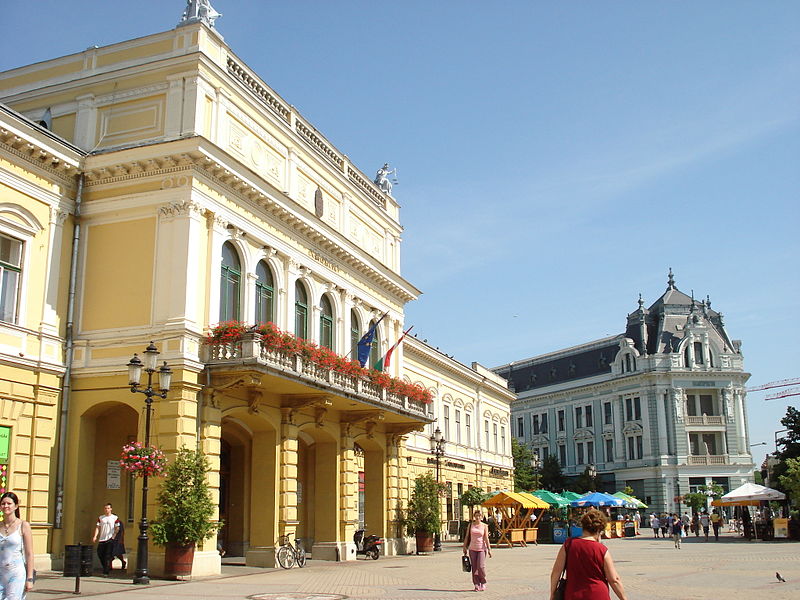 Nyíregyháza is a dynamically developing city located in the northern corner of Hungary. The town is situated next to the holiday resort area of the lake Sóstó (“Salty Lake Bath”) with natural thermal water, an open-air museum, a great forest and one of the most famous zoos in Hungary keeping over 500 different species in a natural environment. The University of Nyíregyháza is the professional and cultural centre of the region. The university is one of the youngest higher education institutions in Hungary, offering a wide range of educational programmes focusing on applied sciences, like teacher-training, economics, or engineering.
Nyíregyháza is a dynamically developing city located in the northern corner of Hungary. The town is situated next to the holiday resort area of the lake Sóstó (“Salty Lake Bath”) with natural thermal water, an open-air museum, a great forest and one of the most famous zoos in Hungary keeping over 500 different species in a natural environment. The University of Nyíregyháza is the professional and cultural centre of the region. The university is one of the youngest higher education institutions in Hungary, offering a wide range of educational programmes focusing on applied sciences, like teacher-training, economics, or engineering.